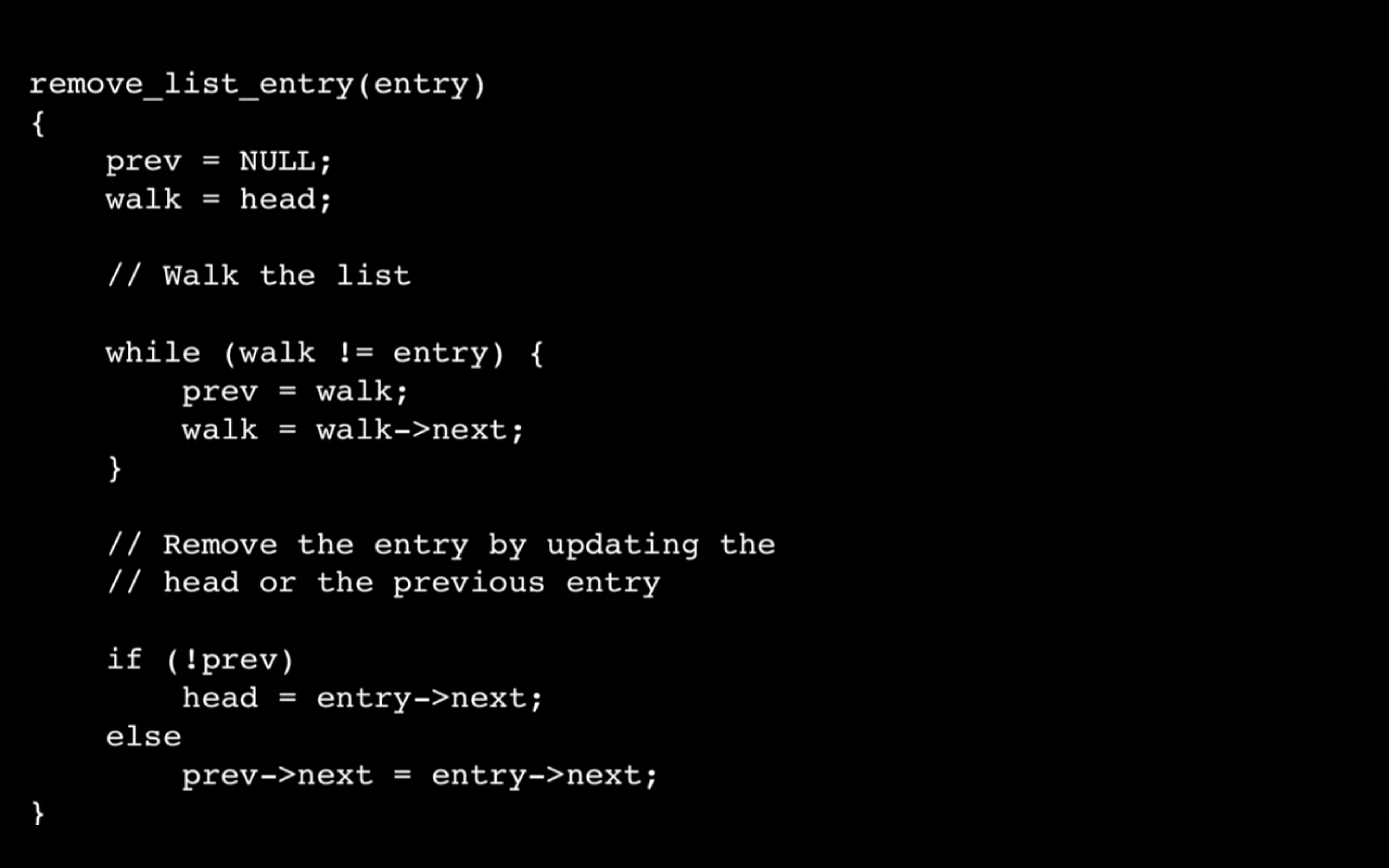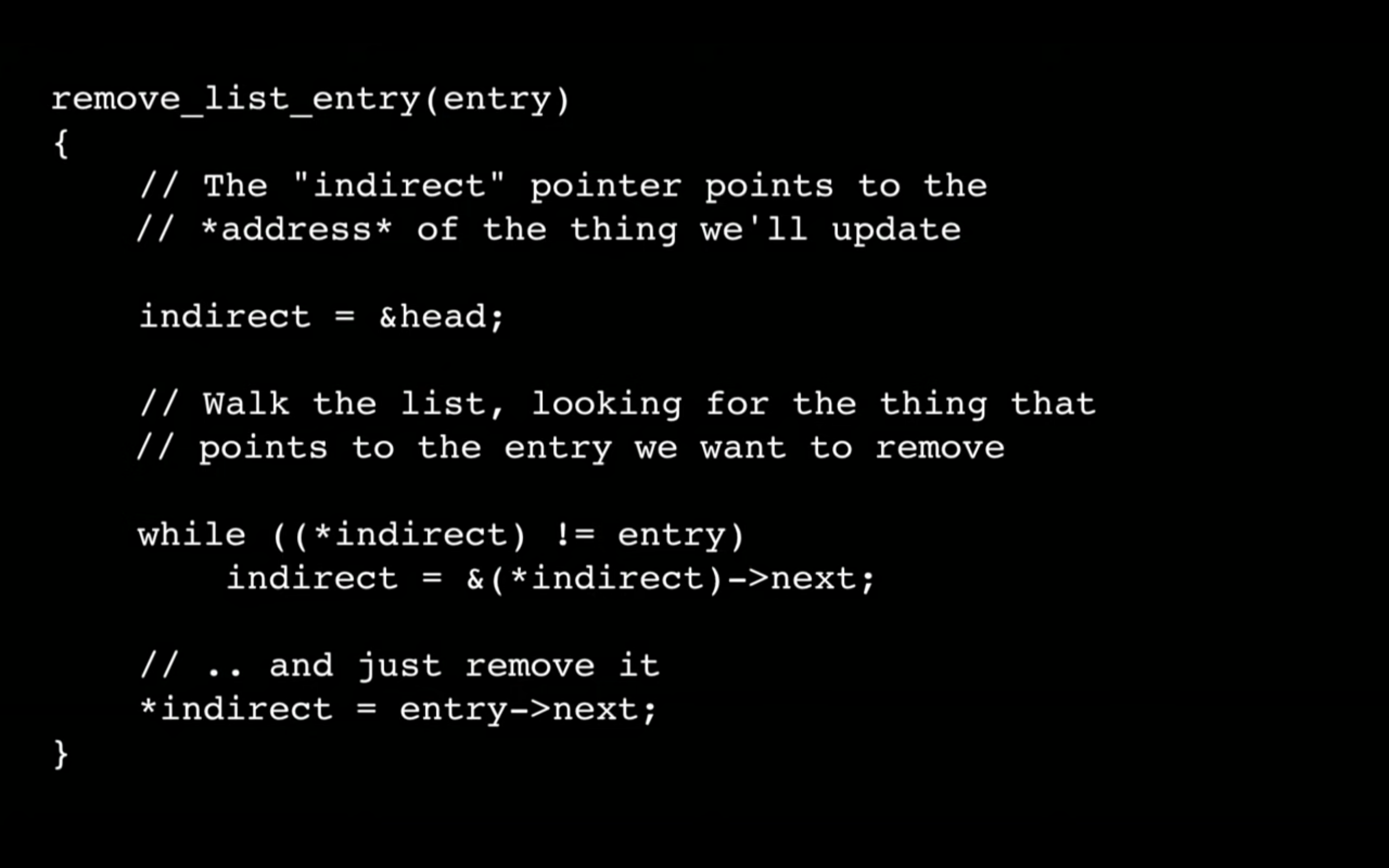Long Live the C: Linked List
A linked list is a collection of objects that are stored in non-contiguous memory locations.
Linus Torvalds and “Good Taste”
In Linus Torvalds’ TED talk “The Mind Behind Linux,” he shares his perspective on what constitutes “good taste” in software engineering. To illustrate his point, he uses an example involving the deletion of a node in a singly linked list. In this post, I aim to comprehend and implement the example Linus Torvalds provided in order to cultivate a sense of “good taste” as an engineer 😀.
Before diving into the detail of deleting a node in a linked list, let’s establish some boilerplate code for creating and printing linked lists in C.
#include <stdio.h>
#include <stdlib.h>
typedef struct Node {
int val;
struct Node *next;
} Node;
Node *build_list(int arr[], int size) {
if (size == 0) {
return NULL;
}
Node *head = NULL;
Node *curr = NULL;
for (size_t i = 0; i < size; ++i) {
Node *new_node = (Node *)malloc(sizeof(Node));
new_node->val = arr[i];
new_node->next = NULL;
if (head == NULL) {
head = new_node;
curr = new_node;
} else {
curr->next = new_node;
curr = new_node;
}
}
return head;
}
void print_list(Node *head) {
while (head != NULL) {
printf("%d ", head->val);
head = head->next;
}
printf("\n");
}
We can use this code to build and print a singly linked list:
// gcc linux_linked_list.c && ./a.out
int main(void) {
int arr[5] = {1, 2, 3, 4, 5}; // 5 integers
int size = sizeof(arr) / sizeof(arr[0]); // 5 = 20/4
Node *head = build_list(arr, size);
print_list(head);
return 0;
}
The output will be:
1 2 3 4 5
Now we are ready to proceed to the deletion of a node.
Deleting a Node in a Singly Linked List: The Bad Taste
The image below is shared in Linus Torvalds’ TED talk and represents the pseudocode for deleting a node in a singly linked list.

Deleting a node in a list with bad taste.
We can implement the pseudocode above in C as follows:
Node* remove_entry_bad_taste(Node *head, Node *entry) {
Node *prev = NULL;
Node *walk = head;
// Walk the list to find `walk==entry`.
while (walk != entry) {
prev = walk;
walk = walk->next;
}
// Remove the entry by updating `head` or `prev`
if (prev == NULL) { // The first node
head = walk->next;
} else { // Not the first node
prev->next = walk->next;
}
return head;
}
This code demonstrates a common approach to deleting a node from a singly linked
list. Note that my implementation of remove_entry_bad_taste returns the head because
in the case where the first node is being deleted, the pointer in the calling function
must also be updated.
However, Linus emphasizes that this approach lacks “good taste” because of the fact that the if-else statement must handle the special case where the node to be deleted is the first node.
We can test the code with the following:
printf("Remove 3.\n");
head = remove_entry_bad_taste(head, head->next->next); // Remove `3`.
print_list(head);
printf("Remove 1.\n");
head = remove_entry_bad_taste(head, head); // Remove `1`.
print_list(head);
The output is:
Remove 3.
1 2 4 5
Remove 1.
2 4 5
It works as expected, but Linus suggests there’s a better way to do this - a way that eliminates the need to handle the special case.
Deleting a Node in a Singly Linked List: The Good Taste
The image below is also shared by Linus and represents the pseudocode for a more elegant approach to deleting a node from a singly linked list.

Deleting a node in a list with good taste.
Here, the indirect pointer points to the head pointer and traverses the list to find
the entry. Once it locates the entry, it simply points to the next node of the
entry. Here is the implementation:
void remove_entry_good_taste(Node **head, Node *entry) {
// The "indirect" pointer points to the *address*
// of the thing we'll update.
Node **indirect = head;
// Walk the list, looking for the thing that
// points to the entry we want to remove.
while (*indirect != entry) {
indirect = &((*indirect)->next);
}
// .. and just remove it.
*indirect = entry->next;
}
The key difference in this “good taste” approach is the removal of the if-else block and the elimination of the need to return the head pointer. Instead, we pass a pointer pointing to the head pointer as a double pointer (Node **head).
To verify the code, we can use the following:
int arr[5] = {1, 2, 3, 4, 5};
int size = sizeof(arr) / sizeof(arr[0]); // 5 = 20/4
Node *head = build_list(arr, size);
print_list(head);
printf("Remove 3.\n");
remove_entry_good_taste(&head, head->next->next); // Remove `3`.
print_list(head);
printf("Remove 1.\n");
remove_entry_good_taste(&head, head); // Remove `1`.
print_list(head);
The output is:
Remove 3.
1 2 4 5
Remove 1.
2 4 5
The output is exactly the same as in the “bad taste” example, but the code is more elegant because it eliminates the need to deal with the special case.
Notes: I haven’t discussed two edge cases: when the singly linked list is empty and when the node to be removed does not exist in the list. These cases are essential to handle in practical implementations but were not covered in this example.